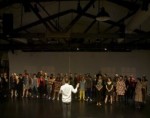
The Radical Linguistics of Mac Wellman
by Julius Ferraro
John Bezark, Jenny Kessler, and I are sitting outside of Green Line Cafe at Baltimore and 43rd. Cars maneuver illegally around one another, sirens howl, and every few minutes the trolley shrieks with metal-on-metal trauma as it slinks across the intersection, a mad cat.
In this year’s FringeArts Festival, Kessler and Bezark are collaborating on Cellophane, one of Mac Wellman’s most unconventional plays. Jenny is directing, and John is producing and designing media. I ask them what they bring to this production—and what brings them to it.
“What Mac Wellman is a master of doing,” Bezark says, “is inviting you to try and make sense of what he’s saying and then deliberately interrupting that process. Because you’re not able to put the actual language into mental boxes, you’re forced to deal with it in the moment. And that makes you very present.”
Bezark’s recent work has been in crafting unique, interactive theatrical experiences for audiences—like a production of Georg Büchner’s fragmentary play Woyzeck where audiences vote online on scene order, deciding the play’s plot. Cellophane presents a different kind of interaction.
I didn’t know what to expect from Kessler and Bezark, but I probably could have guessed. A pair of young, hip-but-not-too-hip New York transplants, they came to Philly because they felt it was more receptive to experimental work, and a better place to start a career. They dissect Wellman’s idiosyncratic, uncanny work intelligently, and speak with grounded realism about how they expect this avant-garde play to be received by an audience.
“I’m very excited about theater being a space—or arena—for interaction,” says Kessler, “rather than an end result, or art ‘object.’” Unlike Bezark, she looks right at me when she speaks, and smiles. Her last piece as a director, The Pocket Universe Trilogy, was a journey into the world of graphic novels a la Scott Pilgrim; she is excited about Cellophane because it is radical. “The harder the thing appears on the outside the more worth there is in doing it. That can get tricky—what’s beautiful about Mac’s work is that it is deeply moving when it’s done right. It’s not something that feels pretentious or feels like…” She puts on a doofy, hipster voice—“it’s not supposed to mean anything, it’s postmodern.”
I am interviewing them because I have been enamored with Wellman’s work for almost a decade after performing in a production of his The Hyacinth Macaw in college. Since then, and I’m not always sure why, his words fascinate me unlike anything else. In Hyacinth Macaw I played Ray, a Willy Loman-esque, middle-aged shoe salesman who is replaced in his familial role by a space alien. I delivered a fifteen-minute-long speech to my family about my values, my “animalistic urges,” and my shameful vices before the alien gave me a glowing snake in a jar, swapped pants with me, and sent me off to stand among the azaleas before I vanished forever.
Wellman’s phrase for his own work is “seriously silly.” He also calls it “woolly” and “wiggly.” But he is extreme in his use of language: idiosyncratic, critical, confounding. From Cellophane:
“Global power breakfast feet meet at X
the precious limo cheese at sunset did.
Global power cheese wolfs it down and
upchucks huge blocks of rear entry
back door weasel craft.
Straw hat and sunspots, unnoticed.
Immobile limo dreams.
Breadline antimater squats on top
the square feet.”
More so than a play like Hyacinth Macaw, where story and character are part of the structure, Cellophane is a “text for the stage,” appearing to be nothing more than a collection of “gleefully bad grammar.”
Google “Mac Wellman Philadelphia” and you don’t find much. Though his students (he teaches the Playwriting MFA at NYU) have performed here (Young Jean Lee, Annie Baker, Nature Theater of Oklahoma, among others), we don’t see anything like Wellman's work. Our established theater companies from tiny Luna all the way up to the Suzanne Roberts use language like the most conventional of Broadway theaters, and our experimental theater makers are more focused on movement, or else clowning, than playing with language.
Wellman, in contrast, represents an aggressive barrage against the disingenuous, aggressive meaning-making of commercial language, of TV language, of naturalistic theater language, of political language. Behind this salvo is a canny understanding of how we receive, interpret, and manipulate language—and a desire to provoke.
Bezark and Kessler intend to focus on this rarely-linear conjunction between words and meaning. In their production of Cellophane, seven people attempt the “American Experiment”—to create a truly democratic society through group decision-making. Impediments to this include the basic challenge of communication but also the invasion of various forms of media—radio, TV, and the internet—which have each taken their turns defining the way that our culture communicates and receives information.
Says Kessler, “We are really excited about how the political context is already in the air, how words get in the way of us actually understanding one another.”
I ask them if words themselves can still mean something in this context.
“I’ve been thinking a lot about this text as a quantum text,” says Kessler. “The words contain meaning, but they contain many different meanings. One person can hear a line and it can deeply resonate with them and mean a single particular thing. The person next to them can have the same strong experience and have a completely different response.”
I watch the promotional trailer for Cellophane. It begins with a Skype session where Bezark asks Kessler “What’s, um … what’s Cellophane about?” The connection immediately breaks down, the image collapsing into static. A mechanized voice reads lines from the the play over a shifting digital landscape—images of opposing politicians shaking hands and laughing, of granaries in the Midwest against a gray sky. A cheery, indifferent metronome bings intermittently over the text. It ends on a line I’ve read before but never reacted to, and I feel a strange emotion, a combination of nostalgia, loss, and wonder, a familiar Wellmanian cocktail.
“Where things rest.
Where all kind is as am.
Where the sign says nothing
and the sky stand straight up
in mute astonishment at the land.”
Jenny Kessler & John Bezark, Cellophane, The Boy Scouts Room at JUNK, September 9-12, http://fringearts.com/event/cellophane-5/.
By Julius Ferraro
August 21, 2016






